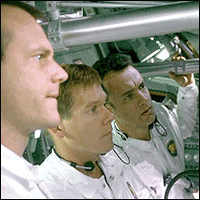 Apollo 13, 1995. Directed by Ron Howard, written by William Broyles Jr. and Al Reinert (Astronaut names). Starring Tom Hanks, Bill Paxton, Kevin Bacon, Gary Sinese, Ed Harris, and Kathleen Quinlan.
Apollo 13, 1995. Directed by Ron Howard, written by William Broyles Jr. and Al Reinert (Astronaut names). Starring Tom Hanks, Bill Paxton, Kevin Bacon, Gary Sinese, Ed Harris, and Kathleen Quinlan.
In honor of the 40th anniversary of the Apollo 11 landing, I’d like to draw your attention to a great little movie about America’s space travel program. No, it’s not the gorgeous For All Mankind, a new Criterion DVD release well worth watching (and which has been written up enough, in my opinion.) No, I’d rather you go to your local DVD store or library and grab Ron Howard’s Apollo 13.
 I’m a minor geek about NASA and any form of space travel, usually preferring dry documentaries on PBS or straightforward productions like Apollo 13 over your more hard-core sci-fi (like Moon). To me, the space program represents this country (and its government) at its best; it reflects the power of the human mind to achieve great things; and, in Apollo 13, shows us that bravery and intellect (and, by extension, a good education) can reap great rewards.
I’m a minor geek about NASA and any form of space travel, usually preferring dry documentaries on PBS or straightforward productions like Apollo 13 over your more hard-core sci-fi (like Moon). To me, the space program represents this country (and its government) at its best; it reflects the power of the human mind to achieve great things; and, in Apollo 13, shows us that bravery and intellect (and, by extension, a good education) can reap great rewards.
The real Apollo 13, the “successful failure” as NASA called it, is a reflection of just how risky this whole enterprise was for the men who traveled to the moon. Their failure to land on that silver orb, and success in returning home safely, almost makes this mission the most heroic ever undertaken. I’m glad they made a solid little movie about it.
Apollo 13 is the story of astronauts Jim Lovell (Tom Hanks), Jack Swigert (Kevin Bacon), and Fred Haise (Bill Paxton) and Ken Mattingly (Gary Sinese), a pilot left behind (because he was exposed to German measles shortly before the trip), on their eponymous mission to the moon. The film begins slowly, with Hanks at home, with his square family, in his square neighborhood, enjoying a summer’s night in his (probably literally) square backyard staring at the moon. We get some discussion over the superstitious number 13, a few laughs at the old technologies (a computer that fits into just one room!), and the usual introductions.
The three astronauts prepare, we see scientists and space geeks working hard, everyone diligent, no worries… or at the very least, few worries. There’s always multiple concerns when you travel to space, but they’re met with reason, not hysteria. Something goes wrong en route to the moon. If you’re traveling to the heavens, just one thing going wrong very possibly means you’re going to die in space. “Houston,” Lovell intoned, now famously, “we have a problem.”
The Service Module’s oxygen tank has exploded, fortunately not taking the whole package out with it. However, it’s wrecked the air that the crew needs for its final descent. It’s hurt the lunar module’s ability to heat itself. And it’s utterly ruined any chance that the spacemen will land on the moon. A dream is destroyed; the men hope that their lives don’t share the same fate.
Apollo 13 is Ron Howard’s masterpiece. In a sense, that’s a rather empty statement, because Howard is, in my mind, one of the most pedantic directors alive. He’s the Robert Wise of this generation, a director with almost no personal touch, and whose movies could be straight-to-network-TV fare rather than cinematic treasures. He’s been lauded, showered with Oscars and Oscar nominations, all of which have kept these statuettes from recognizing better movies. Look at the list of Howard’s movies: Willow (crap), Cocoon (patronizing), Parenthood (should have been an extended TV pilot), Backdraft (the sole saving grace here is that its score was used to great effect in the Japanese “Iron Chef”), EdTV (The Truman Show is better and so much more daring), How the Grinch Stole Christmas (his worst, and as much an crime against Dr. Seuss as “Hogan’s Heroes” was to POW camps), A Beautiful Mind (a rather silly and damaging look at mental illness, and a travesty to the real story of Dr. John Nash), The Da Vinci Code (a wonderful movie… if you can laugh at its excesses), and Frost/Nixon (decent, but an utterly sanitized 70s.)
In part, this list of totally uninspiring, bland movies shows us why Apollo 13 was the perfect vehicle for Howard. This can be said for Tom Hanks as well, who I also believe is horribly overrated, and has rarely made a daring movie in his life, too (Toy Story is about as good as it gets for Hanks–and don’t get me started on Saving Private Ryan). The Apollo space program is as wonderously square as you can get, and by showing us the way these men (they’re all men–women are nobodies in Howard’s oeuvre) respond to things gone horribly awry, you’ve got the stuff of great drama. I’m convinced that other directors–Spielberg, Soderbergh, you name your own–would have wrecked Apollo 13. They might have felt the need to jump back and forth to family more often, to have bizarre camera angles, show more panic, thrust a 70s soundtrack into the picture, etc.
Howard is economical in Apollo 13, seemingly facing this project with the same cool head the technicians wore when everything went pear-shaped. At no point does the picture careen out of control, nor does it seem to accelerate, which is perfect. Apollo 13 is a nail-biter, in spite of the fact that there’s no yelling, no running, no hysterics.
There’s a now famous scene where a bunch of guys with pocket protectors, fat glasses, and slide-rules stare at a long table full of… stuff. Stuff that happens to be identical to what is in the spacecraft, hundreds of thousands of miles away. These engineers need to make a filter and other life-saving devices out of these spare parts (which includes a tube-sock–they actually use it), and succeed. We see them putting things together, and radioing back instructions about what to do. It’s a thrill to watch, even if everyone’s going about their business so calmly. No other director could have had a long shot where the camera zooms down a long row of men bent over paper and slide-rules, calculating, and made that scene so thrilling. We know from the steady direction and great script (not to mention the solid work from the actors) that every calculation must be correct, that lives hang in the balance. When they’re successful, roaring music doesn’t blare, but we simply see a fan work, a filter engage, and know that one step has been completed. So take a breath, nod, and move on, because more are needed before splashdown.
The casting is perfect. Howard avoided bringing on actors who might have grandstand or make some sort of ’statement’–Hanks is ideal as the commander of this nearly-doomed crew, and you’ve got one of the best line-ups of solid supporting players in the last twenty years: Kevin Bacon, Gary Sinese, Bill Paxton, Ed Harris and Kathleen Quinlan, the latter two nominated for their supporting roles (though Quinlan is hardly memorable.) Like the astronauts in real life, this crew seems to understand that this is not about personal glory but putting in good work for the sake of the whole.
Apollo 13 is probably the best movie ever made about our space program, in part because its a feature-film, as opposed to a documentary. For All Mankind is a treasure, and In the Shadow of the Moon was fun, if a bit propagandistic in its attempt to uplift (a fate that, again, Apollo 13 utterly avoids.) The feature film takes us deeper inside the characters, right into the cockpit, and has the burden of making all this credible… and interesting.
Apollo 13 succeeds, by showing us that bravery–and success–are often times the stuff of slide rules and patience and science. Apollo 13 is a movie very much like the space program and the astronauts themselves–tough, humble, patriotic but not flag-waving, intelligent, and, for those of us who dig this kind of thing, a solid entertainment.
